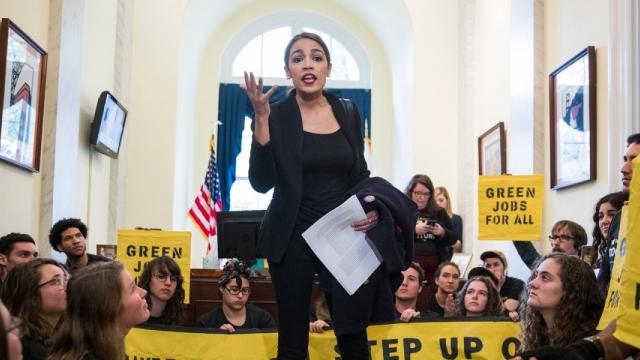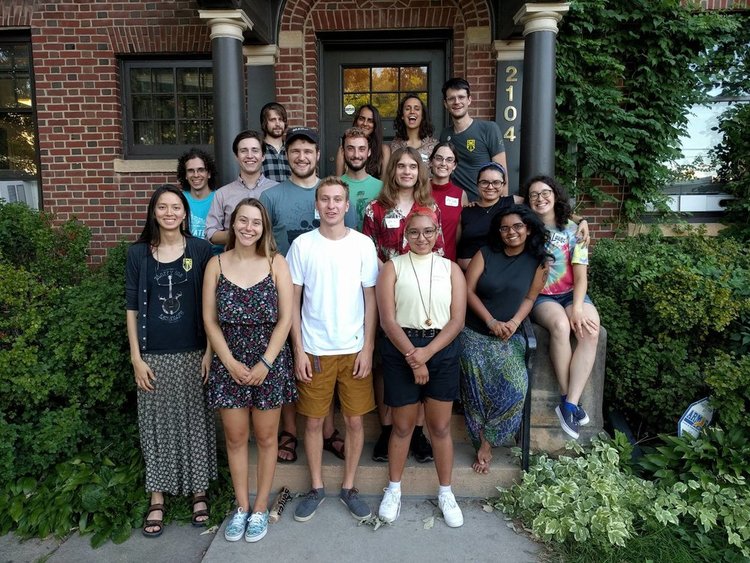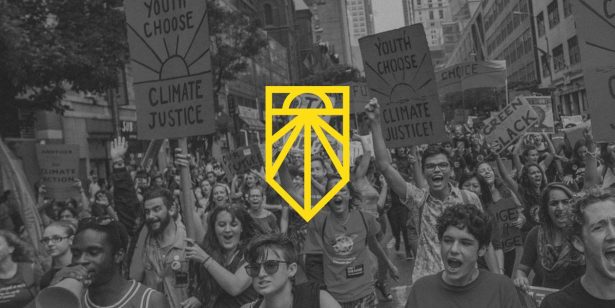
While we might roughly mark the gestation of a growing new left youth activism in the United States from Occupy Wall Street to Bernie Sander’s revelatory campaign in 2016, over the last year, new activist movements led by young people have quickly emerged in the U.S., admittedly with most of them engaged in traditional single issue advocacy not much different from that which came before.
Arguably the most interesting of these groups, the Sunrise Movement, composed of activists from high school age to their mid-20s, seemed to come out of nowhere to challenge power in the form of targeted Congresspeople and to more broadly tackle the climate crisis in a loud but uniquely jubilant voice.
Sunrise seems to have a wider strategy than most environmental groups, including many that are much older, making connections between the ecological crisis and issues of social justice that haven’t been highlighted enough by the activists who came before them. Most of us got our first real view of the group on November 13th, when they occupied Nancy Pelosi’s office in Washington, D.C. alongside the youngest female Congressperson in U.S. history, Alexndria Ocasio Cortez, to demand the creation of a Committee on a Green New Deal.
51 of the activists were arrested for taking part in the action.
Sunrise activists have already become known for singing in a unified voice at protests, reviving classic protest songs like “Which side are you on?” and carrying signs that directly confront politicians with phrases like “No more excuses” and “Do your job”. Their main focus is to push politicians to craft and pass the Green New Deal championed by Ocasio Cortez and other progressives, many of them also newly elected members the U.S. Congress.
Some of the initial proposals for a GND are ambitious and somewhat optimistic, with two key goals being to make the U.S. transition to 100% renewable energy by 2035 and an end to all fossil fuel emissions in the country by 2050.
As a spokesperson and founder of Sunrise, Varshini Prakash, told a recent gathering of activists, “My nightmares are full of starving children and land that is too sick to bear food, of water that poisons that which it should heal, and of seas that are ever more creeping on our shores… But my dreams are also full of a rising tide of people who see the world for what it is, people who see the greed and selfishness of wealthy men, of fossil-fuel billionaires who plunder our earth for profit.”
The group is wise to emphasize the out-sized role played by ‘fossil fuel billionaires’ who have ruthlessly driven this crisis, a descriptor which Prakash in the article cited above says she first heard used by Bernie Sanders in his campaign for the presidency.
While they may emphasize a positive approach to activism, the Sunrise Movement is under no illusions about the ability of the so-called ‘free market’ to solve a problem of its own creation. One thing that is often proposed to alleviate climate change, a tax on carbon, is problematic because, as Evan Weber, another spokesperson for the group recently explained, “Our concerns with a carbon tax would be ensuring that the people least responsible for climate change are not shouldering most of the burden for it.”
One of the key things that differentiates this movement from most of their environmentalist allies is the realization on the part of these activists that while climate change is the central issue, it’s connected to many others from the national fight for a $15 an hour minimum wage to the Movement for Black Lives. It now seems obvious that a good way to tackle the problem of climate change is a transformative program that creates good jobs for all in a new, sustainable economy.
As Demond Decker of the New Consensus think tank explained to the UK Guardian, “You can’t address the climate crisis without these other issues being addressed as well. The entire economy is built around fossil fuels. The same economy that creates rampant poverty and wage stagnation is the economy that’s built around fossil fuels.”
While the 2015 Paris Agreement, which already seems like something from the distant past, was seen as a victory for climate change activists, it’s important to note that it doesn’t have any enforcement mechanisms to make governments live up to their commitments. Movements like Sunrise and the UK’s Extinction Rebellion might inspire activists in the countries that are still signatories to the deal to not only abide by it but go much further than the already dangerous 1.5° Celsius (34.7° Fahrenheit) warming it allows for in its best case scenario.
One of the greatest fears American environmental activists have is that the Select Committee on the Climate Crisis (already renamed by the Democratic leadership from the proposed Committee on the Green New Deal) announced by the future Democratic Speaker of the House will be toothless. Offering the same old rhetoric without action they’ve seen in the past.
As reported by The Hill, unlike the earlier Select Committee on Energy Independence and Global Warming that was disbanded by Republicans when they last took control of the House, the new body will not be able to issue subpoenas, greatly limiting its powers. Instead, as explained by Rep Steny Hoyer, the Democratic Whip in the 116th Congress, “It will be a re commendatory committee to the Energy and Commerce Committee and the environmental committees.”
On top of this Speaker Pelosi has also made it clear that her colleagues will be hamstrung by Paygo rules that will make it necessary for any proposed legislation to be paid for with cuts to other spending or new taxes, making something as ambitious as a Green New Deal (or Medicare for All) all but impossible. Although there was never any plan to proceed with the GND before 2020, with the proposed Committee being tasked with creating it, the Democratic Party leadership is already trying to undercut its prospects.
While it will take some time, the failure of Pelosi and other Democratic bigwigs to take the either the climate crisis or these activists seriously may create a lane for primaries in 2020 to bring even more progressives into the country’s federal government, shifting the balance of power in the party. For their part, the Sunrise Movement seems ready to continue to pressure officials and keep the idea of a Green New Deal in the public eye, even at the risk of arrest.
Another issue that should be connected to the larger movement to address the climate crises is the issue of militarism. The United States military is not only the largest user of fossil fuels and polluter in the world, it and other armies are usually exempt from international agreements concerning climate change, an oversight that will have to be rectified going forward if the issue is to be addressed.
With dire news coming last year from the UN sponsored Intergovernmental Panel on Climate Change (IPCC) and even the American government, it’s become clear that the window for action on the climate crisis is rapidly closing. It has in a sense been a story of the failure of successive generations to grapple with the necessary changes that will have to be made to whole societies and to the global economic system that values profit over the life of the planet we all share.
A Green New Deal in the world’s most powerful country is a good place to start.


















